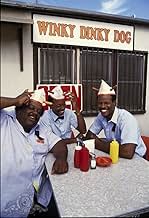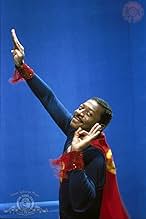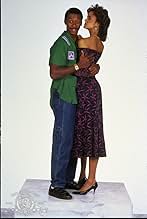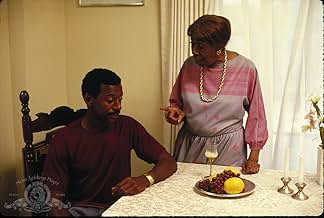Ajouter une intrigue dans votre langueAn actor limited to stereotypical roles because of his ethnicity, dreams of making it big as a highly respected performer. As he makes his rounds, the film takes a satiric look at African Am... Tout lireAn actor limited to stereotypical roles because of his ethnicity, dreams of making it big as a highly respected performer. As he makes his rounds, the film takes a satiric look at African American actors in Hollywood.An actor limited to stereotypical roles because of his ethnicity, dreams of making it big as a highly respected performer. As he makes his rounds, the film takes a satiric look at African American actors in Hollywood.
- Réalisation
- Scénario
- Casting principal
- Récompenses
- 4 victoires et 4 nominations au total
- Sitcom Boyfriend
- (as Sean Michael Flynn)
- Tiny
- (as Ludie Washington)
Avis à la une
Townsend plays an aspiring African American actor, Bobby Taylor, who spends all day at auditions where he is told by a committee of white people that he is "not black enough", and to come back when he sounds "black enough". And the parts are all for gangsters and pimps. Bobby aspires to play a black Superman someday, or some other dignified and heroic role, but things are not looking up for him to get that kind of a part.
Meanwhile he does have a day job at "Winky Dinky Dog", a hot dog stand where his coworkers tell him to forget this acting dream and pay attention to his "actual" job and "actual" opportunity there. Serving fast food. You have to see the hats with hot dogs sticking out of them. Hilarious.
Bobby is a prolific day dreamer, and this helps pad the plot with some very funny satirical skits including a take on Siskel and Ebert's old film review show, except this one is called "Sneaking Into the Movies".
I haven't found this one on streaming or cable lately. Maybe folks would be offended without some context. Many people have been asking why there isn't more African American cinema in the boutique label Criterion collection. Many have discussed adding "Moonlight", which isn't a bad idea, but if part of Criterion is introducing people to new films, why not add this to the collection? It's not that well known anymore. Oh, and people often say, why is the DVD so bare? Why no commentary track? The reason is that Robert Townsend, who directed and wrote this film as well as starred in it, had to put the entire thing on a credit card. No studio would back it. So I'm sure he wasn't about to lay out any more dough for a commentary on a project he wasn't even sure would succeed.
This one is worth seeking out. I'd recommend it.
Movies in general are so formulaic that even most independent films are pretty routine and by-the-numbers.
Maybe that's why "Hollywood Shuffle" feels so refreshing, like a much-needed change of pace. Most indies are made almost entirely by hand---one man writing, directing, producing (hey, they need every single spare cent they can get their grubby hands on) and this one is no exception.
Townsend wears all the indie hats here and he wears them proudly.
This is the film that introduced the world to Robert Townsend. Well, that was it's whole purpose. Like "The Brother McMullen," this star-vehicle was written and directed by Townsend about his dream to make it as a professional actor, trying to break into Hollywood, while at the same time, trying to over-come the cruel limitations mainstream Hollywood has set up for black people who want to act... and actors, in general.
Whereas the '70's was the birth decade of the blaxploitation, so many of them were just cheap, cheesy, corny knock-offs of popular white films. Blaxploitation got more blacks into films, but the films themselves weren't really about anything. "Hollywood Shuffle" is a Blaxploitation film that really has something to say... that has an agenda.
There is so much burning talent, so many struggling entertainers wanting to make something of themselves, that Hollywood can afford to treat the auditioning talent the same way a really strong cleanser treats germs.
Townsend's efforts to make this movie are inspiring--he borrowed every dollar he could, asked for movie footage that was left on the cutting-room floor, called in every favor he could, threw everything he had and more to get this one made.
To tell his story, get his foot in the door... and at the same time, tell a story about what this kind of life is like. For those with talent who dare to dream big.
Greats Keenan Ivory Wayans and John Witherspoon have bit players as people who work at a hog stand in the neighborhood who don't ask for much out of life... and don't get it. They're the kind of cynics who believe, "You're a fool for following your dreams."
When you near the end of your journey in this world, you really fully understand the meaning of the old phrase, "Nothing ventured, nothing gained."
Townsend interlocks a variety of skits with this all-too autobiographical tale, all of which are pretty funny and inspiring. You have to admire the way that Townsend wants to put out some legitimate roles for black actors to play and black actors to idolize. But most of his skits go on too long after the point has been made and there are quite a few moments that feel like someone (Townsend obviously) should have punched up. Townsend is a far better actor than he is a writer/director.
Perhaps because he is only a filmmaker by necessity for this one. He's more interested in using this to make up of all those dream roles he never got to play and showing his chops as an actor than really making a great movie.
There's a scene where he takes-off "Siskel & Ebert"--before everyone started doing it. Almost all the skits (where Townsend is fantasizing his dream roles as an actor) go on way too long, probably because Townsend is far less concerned with how funny the skits/movie is and more interested in using this movie to play all the dream roles he never got to before.
Every actor is perfectly cast, especially Townsend himself. It's great to see him playing all these roles you know he's always dreamed of doing (he plays them while his character actually IS day-dreaming).
The movie captures the struggle of the out-of-work actor just right. We see lines and lines of actors warming-up, rehearsing their roles, going into the audition... all to hear, "Thank you, next!" But some blessed, precious few are picked.
But those that are black are given racially-biased drivel to perform. Ethnic caricatures that shame and set back their race. Brothers and sisters who talk like stock characters from the slave era, wearing redneck farm clothes, picking cotton, eating chicken and getting stinking drunk. Townsend tirades many black archetypes, most of which went out of style around the same time as black-face. Lil' Bobby obviously wants to say something about the way the brothers and sisters are treated in the biz. There are some moments here you'll roar with laughter at, as well as put a lump in your throat and a strange feeling of hope and pride.
Like many other breakthrough films, especially independents, "Hollywood Shuffle" was another arrival of a fresh new talent. It happens as often as the rise and setting of the suns, but here is a film where it feels a little more special because Townsend was really about something. You can see it here, not only in some of his satirist scenes, but some of the quieter moments where real drama in brewing and dreams are at stake.
We see where Townsend is asking himself if he's good enough, if he face the whole world (which is how it is when you're struggling to make it as an entertainer or in life) and when life-long happiness is at stake. It almost hurts. And at the end of it all, when we wonder for Townsend's character, Bobby's sake what will become of him? And then we realize we already know. We just found out.
It's like looking in the sky at the stars like you always do and then there's a brand-new star shining in the night sky, standing out just a little bit bigger than the others. Haven't seen that one before. Hey, is that a new one? Couldn't be, could it? I don't remember there are so many. Another star is born.
Or made.
--Love (or Like), Dane Youssef
Robert Townsend, infant terrible of the late 80s makes a splashy, dynamic debut in "Hollywood Shuffle." There's no doubting Townsend's unbridled energy, imagination, and punch. Here's a man who has something to say, and uses comedy, parody and satire to make his points.
How the film will appeal depends on individual tastes. However, Townsend has assembled a good looking cast, which throws itself into the proceedings with enthusiasm and verve.
More power, Mr. Townsend.
Most impressive is the background to the film, which makes the finished product all the more impressive. Townsend's freshmen effort is a true success, and goes where few first timers are normally able to go.
8/10
The story is about a young, talented and aspiring actor who wants to make it in Hollywood as a director. But when he tries out for roles, he meets a lot of stumbling blocks. Many of these are about his racial background (i.e. he's not black enough, he's too black, doesn't act black, etc. etc.). Eventually he's offered a role but will he throw away his dignity to accept it? Can young Robert make it in Hollywood without "selling out"? Will his peer drag him down? To find out you'll just have to watch Hollywood SHUFFLE.
Highly recommended film.
Le saviez-vous
- AnecdotesShot without permits. The crew wore UCLA T-shirts so they could pass themselves off as students learning how to film in the field.
- GaffesIn the "Chicago Jones" movie clip, the girl is wearing a white dress. When they jump, her dress is red.
- Citations
The guy from the Dirty Larry clip: What you say, honky sucker pig-head jive-turkey fool?
- Bandes originalesNot Just One in a Million
(Bobby's Theme)
Sung by Patrice Rushen
Music by Patrice Rushen
Lyrics by Patrice Rushen and Sheree Brown
Meilleurs choix
- How long is Hollywood Shuffle?Alimenté par Alexa
Détails
- Date de sortie
- Pays d’origine
- Langue
- Aussi connu sous le nom de
- Hollywood Shuffle
- Lieux de tournage
- 5063 Pico Boulevard, Los Angeles, Californie, États-Unis(as Davi's Barber shop)
- Société de production
- Voir plus de crédits d'entreprise sur IMDbPro
Box-office
- Budget
- 100 000 $US (estimé)
- Montant brut aux États-Unis et au Canada
- 5 228 617 $US
- Week-end de sortie aux États-Unis et au Canada
- 95 667 $US
- 22 mars 1987
- Montant brut mondial
- 5 228 617 $US
- Durée1 heure 21 minutes
- Couleur
- Mixage
- Rapport de forme
- 1.85 : 1

































